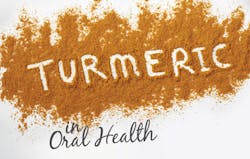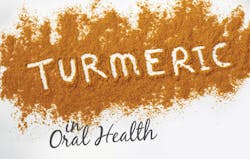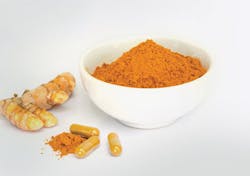Turmeric in oral health: Benefits are touted on social media, but research results are limited
By Amanda Dutra, BSDH, Leslie Briceño, BSDH, Jackie Dent, BSDH, and Kathryn Bell, RDH, MS
Within the last several years, a growing interest in all-natural medicines and products has surfaced on popular social media sites and marketing agents, such as Pinterest and Livestrong. Social media continuously draw attention to the alternatives to traditional medicine. Turmeric has become a commonly recommended agent on these sites.
Turmeric has been touted to boost cognitive function, fight inflammation, support cardiovascular function, promote youthful skin, support joint and muscle health, boost detoxification, promote healthy mood balance, and support natural weight loss.1 Additionally, these sites also propose the use of turmeric as a tooth whitener, remedy for toothaches, and as an adjunct in tightening gums and healing gum inflammation.2
Turmeric is a widely used plant in Eastern medicine and is indigenous to Southeast Asia and cultivated in India.3 Turmeric belongs to the ginger family and is derived from an herb called the Curcuma longa. The active ingredient, curcuma, originates from the rhizomes of the Curcuma longa. The terms curcuma, curcumin, and turmeric are often used interchangeably. Curcuma or turmeric is typically orange with a rootlike structure. It can be found in various forms such as a dry yellow powder, tablets, or a liquid extract.
Its bitter yet slightly sweet taste is why turmeric is most commonly used as a fresh spice.3 However, research on turmeric also claims a wide spectrum of therapeutic effects such as anti-inflammatory, antioxidant, antibacterial, antiviral, antifungal, and wound healing.4 Many developing countries rely on natural remedies such as turmeric for health care.3
Considering these recommendations are highly visible on social media, it is important to evaluate the current research supporting these oral health outcomes. The purpose of this article is to summarize the available literature regarding the use of turmeric for oral health benefits.
Gingival inflammation - Turmeric is most commonly recommended for its anti-inflammatory properties. Several studies have evaluated the effectiveness of turmeric in controlling gingival inflammation.
One study evaluated the ability of turmeric to reduce gingival inflammation and impact levels of inflammatory markers in the gingival crevicular fluid. This was a double-blind, randomized control trial that evaluated turmeric, chlorhexidine, and a combination of chlorhexidine and metronidazole applied in gel formulations. The results of this study demonstrated that curcumin and chlorhexidine with metronidazole showed greater reductions in gingival inflammation compared to chlorhexidine alone, as well as a statistically significant difference in the levels of inflammatory markers after treatment.2 While these results are promising, the number of participants was low (n=60) and limits generalizability.
Turmeric has also been studied in a mouthwash formulation. A pilot study compared the use of chlorhexidine with turmeric as an antimicrobial rinse. The study was composed of three randomly selected groups. Group one received scaling and root planing (SRP) followed by chlorhexidine mouthwash. Group two received SRP followed by curcumin mouthwash, and group three received SRP alone. In the end, the study showed a significant difference (p <0.05) between both groups using mouthwash compared to SRP alone. When reflecting on the use of curcumin or chlorhexidine mouthwash post-SRP, there was not a statistical difference.5 These results support the use of turmeric as an alternative agent, but caution must be considered due to discrepancies such as small sample size (n=30).
An additional comparison study with chlorhexidine gluconate (CHX) offers some evidence of turmeric being beneficial for the use of effectively treating gingivitis and reducing inflammation. This study consisted of two groups of 50 participants each. Group A was given CHX mouthwash and group B was given turmeric mouthwash. They were instructed to rinse with 10 ml of mouthwash twice a day after brushing. Both groups showed significant reduction in plaque and gingival indices. This study was relatively short, lasting only three weeks.6
The above studies demonstrated that turmeric and chlorhexidine have comparable antiplaque and antigingivitis effects. While these studies have promising results, the low number of participants and short study durations limit the reliability of these conclusions. It is important that more research is conducted in regard to the anti-inflammatory effects of turmeric.
An adjunct in SRP - It has been suggested that turmeric may have an important role in managing oral health as an adjunct to SRP. Mechanical debridement alone may not be enough to remove the pathogenic flora in patients with periodontal disease.7 A study with 30 subjects was conducted to analyze the effects of turmeric gel as an adjunct to SRP therapy. The examiners used two nonadjacent sites in different quadrants of the mouth. Thirty sites were treated with SRP followed by application of turmeric gel, while the control sites were treated with SRP alone. Both the experimental sites and the control sites demonstrated reductions in plaque index, gingival index, bleeding on probing, probing depths, and improvements in clinical attachment loss. Participants within the study did not experience adverse effects.7 The materials and methods section of this article lacks enough detail to replicate the study. Additionally, the examiners were not blinded, which introduces the potential for bias. Paired with the low number of participants, these concerns present significant issues with the validity of the study results.
Another small study examined the use of turmeric and curcumin dental chips placed after SRP in comparison to SRP alone. The study involved eight men and seven women between the ages of 20 and 40. They were split into three groups with each individual having three periodontal pockets. The first group underwent SRP alone; the second group underwent SRP with the placement of curcumin chips posttreatment; and the third group underwent SRP followed by the placement of turmeric chips. The group that used curcumin chips posttreatment showed a significant reduction in comparison to the other groups.8 There are discrepancies throughout the results of this study, making it appear unreliable. Additionally, the insufficient number of participants is a concern and suggests the need for further research.
Recommended dosage - Overall, turmeric is generally considered safe. However, some have experienced adverse reactions such as gastric irritation, stomach upset, nausea, diarrhea, allergic skin reaction, and antithrombosis activity interfering with blood-clot formation.9
In addition, there is little information regarding the safety of turmeric at high doses. The clinical studies reviewed in this article were inconsistent regarding the dosage of turmeric. LexiComp Online for Dentistry lists a wide range of dosages for the daily use of turmeric (500-1,500 mg is common, and higher dosages up to 8 g per day have been studied).10 Further clinical studies are needed to help determine the optimal dosage of curcumin.
There are limited studies demonstrating the benefits of turmeric. The available research studies provide limited evidence to support its use in dentistry. However, in light of turmeric’s high visibility as a suggested oral health medicament on popular websites, more research should be conducted to determine safety and efficacy.
The primary concerns with the existing studies are that sample sizes are small and the study durations are fairly short. The lack of information about a standard recommended dosage for turmeric is another serious concern. Larger scale, more comprehensive studies on turmeric and oral health should be completed to further guide practitioners in making patient recommendations for use of turmeric for oral health. RDH
Amanda Dutra, BSDH, Leslie Briceño, BSDH, and Jackie Dent, BSDH, graduated in 2017 from the School of Dental Hygiene Studies at Pacific University in Hillsboro, Oregon. Kathryn Bell, RDH, MS, is an associate professor with the dental hygiene program.
References
1. Dr. Mercola. Pure turmeric 95% curcumin 1000 mg with black pepper as bioperine, 19x more potent than others, 2000% increased bioavailability, vegan, gluten free, 60 capsules (1 month supply). Pinterest. 2017. Available at: http://pin.it/CDmw3Mc. Accessed May 5, 2017.
2. Canole D. Start Brushing with Turmeric Toothpaste and Watch What Happens to Plaque and Gum Disease. www.healthy-holistic-living.com. 2017. Available at: http://www.healthy-holistic-living.com/turmeric-paste-gum-disease.html. Accessed May 5, 2017.
3. Farjana H, Chandrasekaran S, Gita B. Effect of oral curcuma gel in gingivitis management - a pilot study. Journal of Clinical and Diagnostic Research. 2014;8 (12): ZC08-ZC10. doi:10.7860/jcdr/2014/8784.5235.
4. Pulikkotil S, Nath S. Effects of curcumin on crevicular levels of IL-1beta and CCL28 in experimental gingivitis. Australian Dental Journal. 2015;60(3):317-327.
5. Muglikar S, Patil KC, Shivswami S, Hegde R. Efficacy of curcumin in the treatment of chronic gingivitis. A pilot study. Oral Health & Preventive Dentistry. 2013;11(1):81-6.
6. Waghmare PF, Chaudhari AU, Karhadkar VM, Jamkhande AS. Comparative evaluation of turmeric and chlorhexidine gluconate mouthwash in prevention of plaque formation and gingivitis. J Contemp Dent Pract. 2011;4(12):221-224.
7. Behal R, Mali A, Gilda S, Paradkar A. Evaluation of local drug-delivery system containing 2% whole turmeric gel used as an adjunct to scaling and root planing in chronic periodontitis. A clinical and microbiological study. Journal of Indian Society of Periodontology. 2011;15(1):35. doi:10.4103/0972-124x.82264.
8. Kudva P, Tabasum S, Gupta S. Comparative evaluation of the efficacy of turmeric and curcumin as a local drug delivery system. A clinicomicrobiological study. General Dentistry Gen Dent. 2012;60(5):283.
9. Nagpal M, Sood S. Role of curcumin in systemic and oral health: an overview. Journal of Natural Science, Biology, and Medicine. 2013;4(1):3-7. doi:10.4103/0976-9668.107253.
10. Turmeric. Lexicomp® Online for Dentistry. http://online.lexi.com/lco/action/doc/retrieve/docid/dental_f/3671050. Published November 14, 2012. Accessed May 15, 2017.


